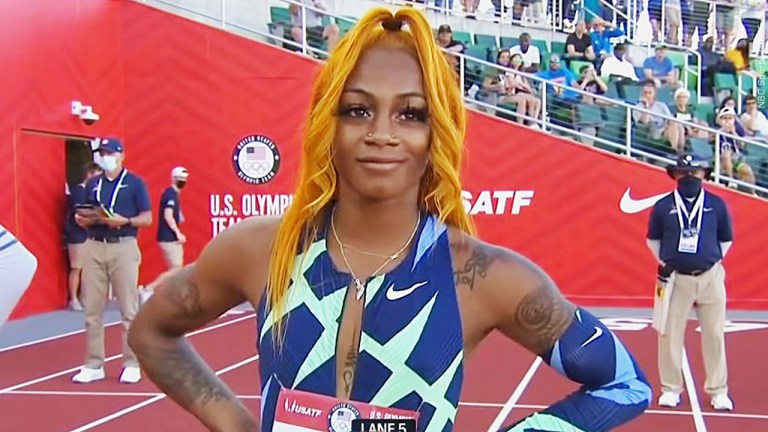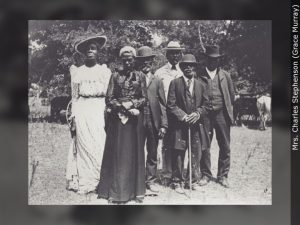Photo NBC Sports / YouTube / MGN. “Track and field star Sha’Carri Richardson”
This article first published 7/21/21 by the Minnesota Spokesman-Recorder https://spokesman-recorder.com/2021/08/13/july-job-report-plenty-of-jobs-but-for-low-wages/
The suspensions of several high-profile Black female athletes from the Olympic Games that begin in Tokyo this week have raised questions about racism and patriarchy in sports, and perhaps even more troubling, who is a woman, and who decides?
Earlier this month, the U.S. Anti-Doping Agency suspended the sprinter Sha’Carri Richardson for 30 days for a positive marijuana test after she won first place in the 100-meter dash at the Olympic trials with a time of 10.86. Richardson, who is African American and self-identifies as queer, acknowledged that she did indeed smoke marijuana to help her cope with grief after learning of the death of her mother.
But the timing of the ban struck many on social media as suspicious and seems more like an assertion of control over Black women’s bodies in an effort to insulate White women athletes from competition. Richardson’s defenders noted that research consistently shows that marijuana does not enhance athletic performance.
Activist and writer Laura Schleifer, who is White, told the MSR that the message sent to Black women is, “Do not outdo White women, who of course have never, ever had an unfair advantage themselves in life. Never.”
More problematic than Richardson’s suspension, however, is a decision by World Athletics—the international governing body that includes track and field-related sports—to ban the South African middle-distance runner Caster Semenya from Olympic competition unless she agrees to take drugs, or undergoes surgery, to suppress her testosterone level. The winner of two gold medals in the 800-meters at London in 2012 and Rio de Janeiro in 2016, Caster has repeatedly refused to do either, but earlier this month Switzerland’s Federal Supreme Court denied her appeal.
At issue is an assertion by World Athletics that it has a right to enforce a rule limiting the amount of testosterone female athletes competing in the women’s 400m to 1,500m events can have. Semenya’s natural testosterone levels reportedly surpass that threshold. The ruling effectively means she cannot defend her gold medal in the 800 meters in Tokyo.
“I am very disappointed by this ruling, but refuse to let World Athletics drug me or stop me from being who I am,” Caster Semenya said in a statement. “Excluding female athletes or endangering our health solely because of our natural abilities puts World Athletics on the wrong side of history.”
“I will continue to fight for the human rights of female athletes, both on the track and off the track, until we can all run free the way we were born,” Semenya said. “I know what is right and will do all I can to protect basic human rights for young girls everywhere.”
Several other Black female athletes have experienced similar setbacks, including runners Christine Mboma and Beatrice Maslingi, both from Namibia. They have been ruled ineligible to compete in the women’s 400-meter sprints based on their natural testosterone levels. The two will be able to compete in the 200-meter race, however.
Scheifler and others see the testosterone limits as an attack on transgender athletes, and Black transgender athletes specifically, even though Semenya and the two Namibian runners are not transgender.
“All of a sudden they are obsessing over women’s ‘hormone levels’ in ways they never would have before, and that’s likely because of the attention that the anti-trans panic has brought to the whole subject of how hormones might influence athletics,” said Scheifler, who promotes both racial justice and trans rights in her advocacy work.
“I also see big-time echoes of eugenics in this, and of Black women being forcibly sterilized. And racist tropes about Black women being ‘hyperfertile.’ and having ‘superhuman strength.’” She said there is a long, disgusting history of White people being obsessed with controlling Black women’s hormones.
The history of anti-Black racism in sports as it affects Black male athletes is rather well-known. White lawmakers managed to drive the invincible African American boxer Jack Johnson from the ring by convicting him on charges of transporting a woman—his own wife—across state lines for “immoral purposes.”
When African American sprinters Tommy Smith and John Carlos raised their black-gloved fists in a Black Power salute at the 1968 Olympic Games, Avery Brundage, president of the International Olympic Committee, suspended them from the U.S. team. And the NCAA banned the dunk after the all-Black Texas Western College defeated the all-White University of Kentucky in the 1966 championship game.
But women, generally, and African American women specifically, experience discrimination differently, because they are often exploited for both their labor and their sexuality. The ghost of Sarah Baartman—a South African woman paraded around Europe as a freak show in the early 19th century by French and British captors who named her the Venus Hottentot—looms large over the debate about the Olympics.
Ben Carrington, a sociologist who focuses on issues of race and culture, wrote in a tweet that the many challenges Black athletes are experiencing at the Olympics underscore a gross imbalance of power.
“Hoping those upset by the Sha’Carri Richardson situation become aware of the power of WADA [the World Anti-Doping Association] and those following Caster Semenya and the other women banned focus attention on the IAAF [World Athletics]. Sport is about power; not the ‘power’ on the field but the power to decide who plays and who doesn’t.”
Sending her support to Semenya, the U.S. gymnast Simone Biles, who has also struggled with racial double standards in her sport, tweeted: “This is wrong on so many levels. Once again men having control over women’s bodies. I’m tired.”








No comment yet, add your voice below!